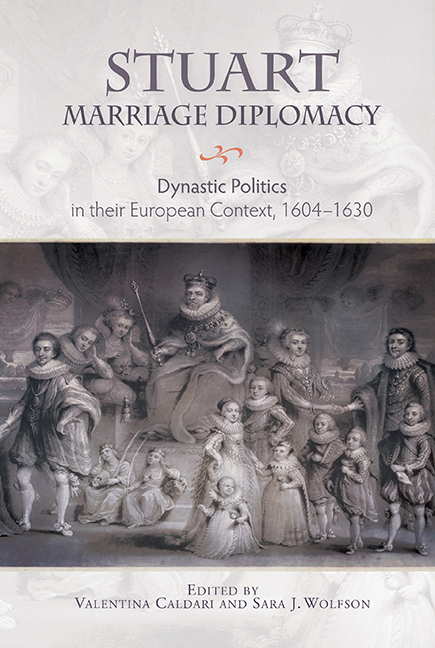Book contents
- Frontmatter
- Contents
- List of Illustrations
- List of Contributors
- Acknowledgements
- List of Abbreviations
- Introduction
- Part One Marriage and the Court
- 1 The French Match and Court Politics
- 2 What Can Be Fuller of Wonder? Buckingham and the Revenge of the Hispanophiles in 1626
- 3 Practical Proselytizing: The Impact of Counter-Reformation Catholicism at the Caroline Court, 1625–26
- Part Two Marriage and Politics
- Part Three Marriage and War
- Part Four Marriage and News
- Part Five Marriage and Continental Europe
- Part Six Marriage and Ceremony
- Bibliography
- Index
- Studies in Early Modern Cultural, Political and Social History
1 - The French Match and Court Politics
from Part One - Marriage and the Court
Published online by Cambridge University Press: 24 October 2019
- Frontmatter
- Contents
- List of Illustrations
- List of Contributors
- Acknowledgements
- List of Abbreviations
- Introduction
- Part One Marriage and the Court
- 1 The French Match and Court Politics
- 2 What Can Be Fuller of Wonder? Buckingham and the Revenge of the Hispanophiles in 1626
- 3 Practical Proselytizing: The Impact of Counter-Reformation Catholicism at the Caroline Court, 1625–26
- Part Two Marriage and Politics
- Part Three Marriage and War
- Part Four Marriage and News
- Part Five Marriage and Continental Europe
- Part Six Marriage and Ceremony
- Bibliography
- Index
- Studies in Early Modern Cultural, Political and Social History
Summary
Since dynastic alliances always required negotiations between two royal courts, we can understand them only by adopting a dual perspective. This is particularly challenging in the case of the Anglo-French alliance of 1625 because the politics of both kingdoms had recently become unsettled, producing fluid situations in which religious ideology and calculations of national interest interacted with manoeuvres over power. Biases in contemporary sources and oversimplifications by later historians also cloud perspectives. Historians have too often interpreted the period through reference to fixed ideological positions and overarching narratives, involving Stuart conflicts with parliament or the state-building of Cardinal Richelieu, without paying sufficient attention to constantly changing circumstances and tactical political calculations. Although recent revisionist studies have considerably complicated understandings of both French and British history in the 1620s, integrating this new scholarship with original research to produce fresh interpretations of international relations presents a daunting challenge.
In this chapter I propose to plunge into the thicket of court politics in both London and Paris in the mid 1620s, in an effort to explain how a marriage alliance was negotiated and why it collapsed in less than two years. But it will first be necessary to set the stage by briefly reviewing Stuart relations with both Spain and France during the previous fifteen years. James I's diplomacy, particularly in the years 1618–23, has traditionally been interpreted as a reflection of his ideological commitment to peace, belief in monarchical legitimacy and pro-Spanish instincts. Although this view, which has roots in critical contemporary comments, contains elements of truth, it seriously oversimplifies. James preferred peace to war and would have welcomed a marriage alliance with Europe's mightiest dynasty and the fat Spanish dowry that it promised to bring. But his aversion to conflict with the Habsburgs can be exaggerated. In 1618, the year in which negotiations for the Spanish match commenced, he supported the more warlike Calvinist party at the Synod of Dort in the Netherlands, encouraged an alliance between Venice, Savoy and the Dutch to counter Habsburg power in Italy, and toyed with schemes to back alternative candidates to the Habsburg Archduke Ferdinand in the next election of a Holy Roman Emperor.
- Type
- Chapter
- Information
- Stuart Marriage DiplomacyDynastic Politics in their European Context, 1604–1630, pp. 13 - 28Publisher: Boydell & BrewerPrint publication year: 2018



